#Preet Judge
Explore tagged Tumblr posts
Text
Tum dost ho, tum hi pyar ho,
Tum kal the aur tum hi aj ho.
Tum mere kal rahoge,
Saans thamne ke baad bhi
Mere sirf tum hi rahoge.
Tum yaad ho, mulakaat ho,
Tum hi to prem ka swaad ho.
Muskaan tum, aansu ho tum,
Ho mera har ehsaas tum.
Aas tum, ho sanket tum,
Mere mann ka vishwas tum.
Mere ho tum, sabke ho tum,
Duniya ka ek hi sach ho tum.
Tum prem ho, tum preet ho,
Manmeet ho Kanha,
Mere manmeet ho
Soooo...don't judge me, alright? Idk why but this song, I'm sure we all still remember it from RadhaKrishn, got stuck in my head today, and then this poem came into being. It's my first time writing a poem in Hindi (can't type in Hindi for the love of Krishna so please ignore that lol) since I've always been more comfortable expressing myself in English. But I hope it's good xD
10 notes
·
View notes
Text
Anupama 22nd June 2025 Written Update: Anupama Empowers Bharti
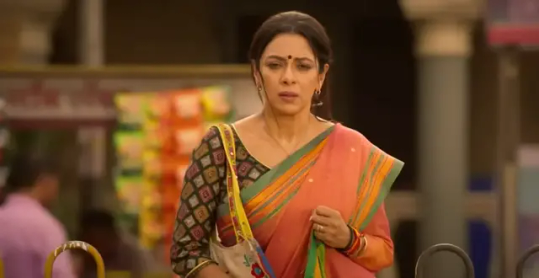
Anupama 22nd June 2025 Written Update: Anupama Empowers Bharti. Today in Anupama Written Update: Bharti Takes a Stand, Paritosh Faces Fire, Anupama’s Past Under Scrutiny This episode of Anupama delivers a powerful cocktail of emotional confrontations, moral dilemmas, and one woman’s silent strength as Anupama continues to guide, guard, and, when needed, gracefully disappear. Bharti’s Truth Bomb: “Mangesh is Suffocating Me” Bharti vents her frustration to Anupama, saying Mangesh is making her feel like the villain for a story she didn’t write. He’s acting wounded, but the real damage is to her peace and her identity. She shares that whispers follow her in the office, and judgment shadows her everywhere. She’s at a crossroads, not knowing whether to go back to Mangesh or take a stand. Anupama, as always, steps up like the warrior guru she is. She tells Bharti: "Aurat sab kuch baant sakti hai, par pati nahi." No filters. No sugarcoating. Just facts. Bharti asks if Anupama’s husband was the same, and in a rare moment, Anupama opens the door to her own bruised past with Vanraj. She tells Bharti to stand tall — not for rebellion, but for sanity. Bharti’s Comeback: From Judged to Journalist Bharti reveals she’s starting an interview series with women who’ve turned their personal pain into power. This isn’t just work — it’s therapy. For herself, and others. She thanks Anupama for lighting the way and refuses to return to Mangesh, no matter how many guilt trips people lay on her. Anupama warns her that the journey won’t be easy. Society doesn’t like women who walk out of pain; it prefers those who quietly stay in it. But she also reassures her — it’s worth it. Bharti’s Questions Hit Close to Home Bharti, now feeling a connection, asks if Anupama has children. That question lands like a soft punch. Anupama remembers the Shahs, Khyati, and all the pieces of her broken family puzzle. Bharti asks why she doesn’t stay with them, and Anupama, choosing grace over gossip, says the time to reveal the truth hasn’t come yet. Bharti agrees to wait. Trust has been built. Paritosh’s Usual Nonsense: Business Genius or Broke Dreamer? Paritosh is at it again. Kinjal finds him working (shocking, really) and questions him. He asks her to trust him. She throws in some sass — rightly so — reminding him that Anupama won’t be there to bail him out again. Paritosh tries to sound legit about his business idea, but Kinjal isn’t falling for it. Nor should she. Meanwhile, in a new house of chaos, Raja is getting grilled by Vasundhara for spending too much money. Turns out, the recipient of the funds is… you guessed it… Paritosh. Raja defends him like he's the next big startup founder. Meeta chips in with the usual “he’s a son of the house” argument, while Khyati screams “he’s spending it on Pari.” Anil and Vasundhara want receipts. Rahi decides it’s time to meet Paritosh face to face. Khyati uses this moment to slander both Rahi and Anupama, but Parag tells her to sit down and zip it. About time. Anupama’s Identity Gets Cornered Back in the leaking apartment, Anupama, Bharti, and Preet are dealing with a literal hole in the ceiling. As if emotional leaks weren’t enough. Preet notices a photo of Rahi and starts questioning Anupama. Bharti steps in to stop the interrogation. Anupama decides she must continue hiding her connection to Rahi — for now. But cracks in her wall of secrecy are showing. Pari vs Paritosh: Karma’s Knocking Pari confronts Paritosh for the money drama. Kinjal, standing like a wall of moral clarity, stands against him. Again. Paritosh, at this point, is a walking disappointment. When will he learn? The answer is probably: never. Manohar’s Side Story: Simplicity with a Stitch of Sadness Manohar, the quiet old soul, is seen stitching clothes for the needy. He’s a man of small actions and big heart. Just as his story warms us up… Precap strikes like a storm. Precap Highlights: Emotional Blackmail and Medical Emergency Manohar’s son walks in and demands property transfer. Cold as ice, he threatens he won’t even show up when Manohar dies otherwise. Emotional blackmail at its worst. Manohar, overwhelmed, collapses. Anupama rushes to help. Anupama 22nd June 2025 Written Update Review: This episode perfectly balances empowerment, old wounds, and family drama. Bharti’s transformation arc is refreshing. She didn’t wait for a hero — she became her own. Anupama’s story continues to thread through others, helping women gather strength even when her own heart is silently bleeding. Paritosh continues to be the poster child for why red flags should never be ignored, while the Rahi-Raja side plot continues to thicken with whispers of truth. Manohar’s subplot adds a raw layer — a reminder that sometimes the kindest souls are the most neglected. Rating: 4.2/5 More power to Bharti, less patience for Paritosh. Read the full article
0 notes
Text
Best Divorce Lawyer in Delhi | Top Legal Experts for Family Law Matters

Divorce is a life-changing decision, and navigating through the legal complexities can be both emotionally and mentally exhausting. When you’re facing separation, choosing the Best Divorce Lawyer in Delhi is crucial to ensuring your rights are protected, your voice is heard, and your interests are fairly represented. At Sandhya Gupta and Associates, we understand the emotional turmoil clients go through during divorce proceedings. Our experienced team of legal professionals provides compassionate, effective, and results-driven legal counsel in all family law matters.
Why You Need the Best Divorce Lawyer in Delhi
Divorce isn’t just about ending a marriage; it involves complex legal issues like child custody, alimony, division of assets, and more. Hiring the best divorce lawyer in Delhi ensures that you have expert guidance on your side to handle all aspects of your case. At Sandhya Gupta and Associates, we offer personalized attention, strategic advice, and legal excellence to help you move forward with confidence.
Whether it’s a mutual consent divorce, contested divorce, or separation involving child custody, our firm brings in-depth expertise and years of experience to the table.
Comprehensive Divorce Services by Sandhya Gupta and Associates
We are a premier legal firm located in Delhi, offering professional services across various areas, including Dwarka and Preet Vihar. If you’re looking for a divorce lawyer in Dwarka, a divorce lawyer in Preet Vihar, or any part of Delhi, we are here to assist you with:
Mutual Consent Divorce
Contested Divorce
Child Custody and Visitation Rights
Alimony and Maintenance
Property and Asset Division
Domestic Violence and Dowry Cases
Annulment of Marriage
Our team comprises some of the best matrimonial lawyers in Delhi, known for their deep understanding of Indian family law, professionalism, and dedication to client satisfaction.
Divorce Lawyer in Dwarka and Preet Vihar��— Local Expertise That Matters
With offices in key regions like Dwarka and Preet Vihar, our legal services are easily accessible for clients in West and East Delhi. Whether you’re searching for a seasoned divorce lawyer in Dwarka or a reliable divorce lawyer in Preet Vihar, Sandhya Gupta and Associates brings unmatched legal proficiency and local insight to support your case.
Our attorneys are well-versed in local family court procedures, judges’ expectations, and regional nuances — giving you a distinct advantage when presenting your case.
What Sets Sandhya Gupta and Associates Apart?
When searching for the best divorce lawyer in Delhi, it’s essential to find a law firm that offers more than just legal representation. At Sandhya Gupta and Associates, we are committed to:
Client-Centered Approach: We listen carefully to your concerns and tailor our strategy to meet your individual needs.
Transparency: From fee structures to legal procedures, we keep everything clear and straightforward.
Strong Courtroom Representation: Our experienced lawyers are skilled negotiators and fierce litigators.
Confidentiality and Compassion: We understand that divorce is a sensitive matter and treat every case with the utmost respect and confidentiality.
Best Matrimonial Lawyer in Delhi — A Name You Can Trust
When it comes to matrimonial disputes, the stakes are often very high. That’s why it’s important to choose a divorce advocate in Delhi who has the legal acumen, empathy, and track record to secure the best possible outcome. Our firm is consistently rated as one of the top choices for clients seeking the best matrimonial lawyer in Delhi. We help clients resolve issues amicably where possible, and litigate assertively when needed.
Tailored Legal Strategies for Every Client
At Sandhya Gupta and Associates, no two cases are treated the same. Our team works closely with clients to understand their goals, analyze their situation, and develop a customized legal plan. Whether you’re dealing with financial disputes, child custody battles, or domestic abuse allegations, we craft our approach to align with your best interests.
Affordable and Transparent Legal Services
Quality legal representation shouldn’t be out of reach. That’s why we offer affordable and competitive legal packages without compromising on quality. As a trusted divorce advocate in Delhi, our aim is to make top-notch legal services accessible to everyone.
We also provide free initial consultations to help clients understand their legal position and options before proceeding.
If you’re searching for the best divorce lawyer in Delhi, don’t settle for anything less than expert guidance and compassionate service. Sandhya Gupta and Associates is here to support you through every step of the legal process, from initial consultation to final resolution.
Frequently Asked Questions (FAQs)
1. Who is the best divorce lawyer in Delhi?
Sandhya Gupta and Associates is widely recognized as one of the top law firms offering the best divorce lawyer in Delhi. With a strong track record, client-centric approach, and deep expertise in family law, we provide comprehensive support for all types of divorce and matrimonial matters.
2. How do I file for divorce in Delhi?
To file for divorce in Delhi, you need to prepare a divorce petition (mutual or contested) and file it in the appropriate family court. The process can involve hearings, evidence, and legal representation. Our divorce lawyers in Delhi will guide you through each step to ensure a smooth process.
3. How long does a mutual consent divorce take?
A mutual consent divorce typically takes 6 to 18 months, depending on the waiting period mandated by the court and other formalities. Our experienced divorce lawyers in Dwarka and Preet Vihar help expedite the process wherever legally possible.
#BestDivorceLawyerInDelhi#DivorceLawyer#DelhiLawyer#FamilyLaw#LegalAdvice#DivorceAdvice#SeparationSupport#MarriageCounseling#LegalHelp#DivorceSuccess#FamilyCourt#DivorceProcess#LawyerLife#LegalTips#DivorceCoach#FindALawyer#DivorceMediation#DelhiLegalServices#DivorceSupport
0 notes
Text
Jasleen Royal Songs That Tug at Your Heartstrings
In the vibrant world of Indian music, few artists manage to carve out a space as distinctive and heartfelt as Jasleen Royal. A self-taught musician and singer, Jasleen’s journey from her hometown of Ludhiana to becoming one of Bollywood’s most celebrated artists is a story of determination, passion, and unwavering belief in her craft. Her unique blend of simplicity and depth has not only captured the hearts of millions but has also redefined what it means to be a modern-day musician in India.
The Early Days: A Passion Ignited
Jasleen Royal’s love for music began in her childhood. Growing up in Ludhiana, Punjab, she was surrounded by the rhythms and melodies of her culture. Unlike many artists who pursue formal training, Jasleen chose a different path. She taught herself to play instruments like the guitar, ukulele, and harmonium, an endeavor that showcased her natural aptitude for music. Her journey was fueled by pure passion and an intrinsic connection to melodies that would later become her signature.
In 2009, Jasleen first stepped into the limelight as a contestant on India’s Got Talent. Her performance of a Punjabi rendition of “Tera Mera Pyar” captivated both judges and audiences, not only for its originality but also for her raw and unpolished approach to music. While she didn’t win the competition, Jasleen left an indelible mark, and more importantly, she discovered her voice as an artist.
Breaking Through: The Bollywood Dream
Bollywood, known for its grandeur and elaborate productions, is not an easy industry to break into, especially for independent artists. Jasleen Royal’s Bollywood debut came in 2014 with the song “Preet” from the movie Khoobsurat. The track, which featured her distinctive voice and minimalistic composition, became an instant hit. The song’s emotional depth and simplicity resonated with audiences, establishing Jasleen as a fresh and authentic voice in the industry.
“Preet” was more than just a song — it was a statement. It marked the arrival of an artist who dared to challenge the conventions of Bollywood music by creating something heartfelt and personal. Jasleen’s ability to connect with listeners on an emotional level became one of her defining traits.
A Unique Musical Identity
Jasleen Royal’s music is a reflection of her personality: unpretentious, soulful, and deeply emotive. Her songs often feature minimalistic arrangements, allowing her voice and the lyrics to take center stage. This approach sets her apart in an industry that often prioritizes grandiose orchestrations and commercial appeal.
Her use of unconventional instruments like the ukulele and harmonium adds a unique layer to her compositions. Jasleen’s voice, often described as raw and haunting, carries a vulnerability that makes her songs relatable. Tracks like “Kho Gaye Hum Kahan” from Baar Baar Dekho, “Din Shagna Da” from Phillauri, and the heartwarming “Love You Zindagi” from Dear Zindagi showcase her ability to craft music that feels both intimate and universal.
Milestones and Achievements
Over the years, Jasleen has worked on numerous projects that highlight her versatility. While she excels at creating soulful ballads, she has also explored different genres and moods. One of her most notable works is “Ranjha” from the film Shershaah. The song, a duet with B Praak, became a chartbuster and earned widespread acclaim. It also brought Jasleen her first Filmfare Award for Best Music Director in 2022, making her the first female to win this prestigious honor.
Other standout tracks include “Raatein” from Shivaay and “Heeriye,” a collaboration with Arijit Singh. These songs not only showcase her growth as an artist but also cement her position as one of Bollywood’s most promising music directors.
Challenges in the Music Industry
Breaking into Bollywood as an outsider is no easy feat, and Jasleen Royal’s journey has been no exception. As a woman in a male-dominated industry, she faced her share of challenges. However, Jasleen’s resilience and unwavering belief in her music helped her overcome these obstacles. She refused to compromise her artistic vision, even when it meant taking the road less traveled.
Her success is a testament to the power of authenticity. In an industry that often prioritizes commercial success over artistic integrity, Jasleen has managed to stay true to herself while still achieving mainstream recognition.
An Inspiration for Aspiring Musicians
Jasleen Royal’s journey is a beacon of hope for aspiring musicians, especially those from non-traditional backgrounds. She has shown that it is possible to make a mark in the music industry without formal training or connections. Her story emphasizes the importance of hard work, perseverance, and staying true to one’s unique voice.
For indie musicians looking to break into Bollywood, Jasleen serves as a role model. Her transition from an independent artist to a Bollywood sensation is a testament to the fact that talent and authenticity can overcome even the most significant barriers.
A Legacy in the Making
Jasleen Royal’s contribution to the Indian music industry goes beyond her songs. She has redefined the role of a music director, proving that minimalism and authenticity can be just as impactful as grandeur. Her music has a timeless quality, and her ability to connect with listeners on an emotional level ensures that her work will remain relevant for years to come.
Conclusion: Celebrating Jasleen’s Journey
From her early days as a self-taught musician in Ludhiana to becoming a celebrated name in Bollywood, Jasleen Royal journey is one of inspiration and triumph. Her music, characterized by its simplicity and emotional depth, has touched the hearts of millions and continues to resonate with audiences across the globe.
Jasleen’s story is a reminder that dreams can come true with passion, dedication, and a willingness to stay true to oneself. As she continues to create music that moves and inspires, her journey is far from over. The world eagerly awaits what Jasleen Royal will create next.
0 notes
Text
PangeBaaz Lyrics - Harman Maan | Gurlez Akhtar
PangeBaaz Lyrics – Harman Maan | Gurlez Akhtar

View On WordPress
0 notes
Text
Evidence Lyrics in Hindi - Preet Judge 2021 Super Hit
Evidence Lyrics in Hindi – Preet Judge 2021 Super Hit
अभीदेन्स Evidence lyrics song is sung by Preet Judge is latest punjabi song lyrics are written ✍🏻 by Preet Judge and director of photography by Sukh Kamboj. This hd video full song is features by Upma Sharma, Money Ramana, Kala Gobindpuria, Baaz. The music of this new song is given by Yeah Proof and the video is directed by Mv Frame Works 🎥. This most popular punjabi song is Produced by Dilpreet…

View On WordPress
0 notes
Text
Majhail Vs Malvain Lyrics - Miss Pooja x Geeta Zaildar
#MajhailvsMalvain #MissPooja #GeetaZaildar #PreetJudge #JassiX

View On WordPress
0 notes
Text
Vikings (Lyrics) Preet Judge Official 2021 Song
Vikings (Lyrics) Preet Judge Official 2021 Song
♪Song송: Vikings ♪Singer🎙: Preet Judge ♪Music🎹 : Sharry Hassan ♪Lyrics📝: Preet Judge ♪Label📀: Collab Music Vikings by Preet Judge – Read Lyrics Coming Soon In DjPunjabNew.Com Releasing On 7th Aug. 2021. Vikings Song Play/Download Download Original Song Mp3 Click Here[soon] Vikings by Preet Judge Official Video 2021 Stay Tuned… Also Visit:- Barsaat (Pyaas 2) – Babbu Maan Leak Latest Hindi Video…

View On WordPress
0 notes
Text
Merry Christmas Colangelo & Pomerantz
"First Cyrus 'Cy' Vance Jr (DA) has Mark Pomarantz (Special Assistant DA/Authr People vs Donald Trump author/Hillary's Attorney) and Dunne cracking the whip on him, then Schumer and Preetinder 'Preet' Singh Bhahara (US Attorney SDNY) show up at his Birthday in October to spank him - Matt Colangelo in December threatening to break his kneecaps- then the leaks and more leaks until he gives in with Cy Vance's garbage case. Uh....this won't be a swell time. This guy is going to find out Soros doesn't pay court costs or keep you out of prison. This in one pile of dog stuff he's going to be sorry he jumped into. Trump will be after his backside too. This man had better lawyer up."
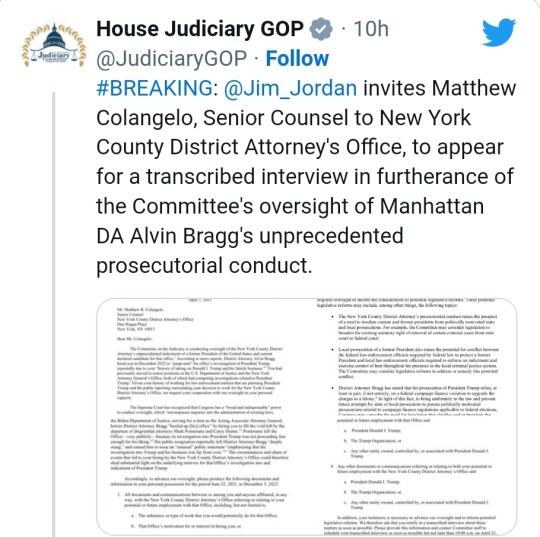
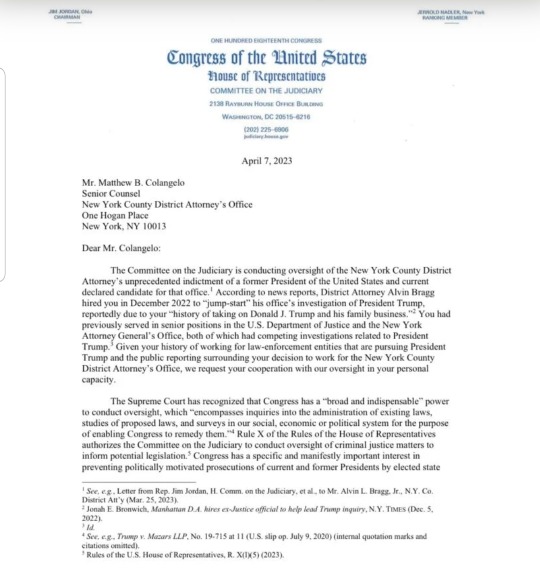
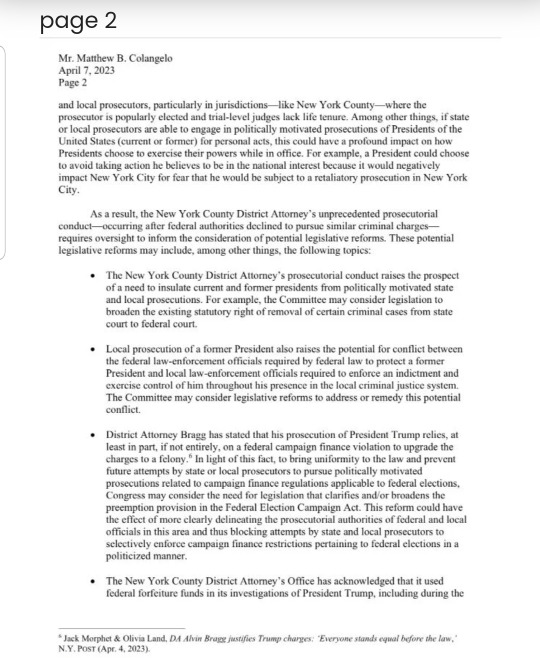
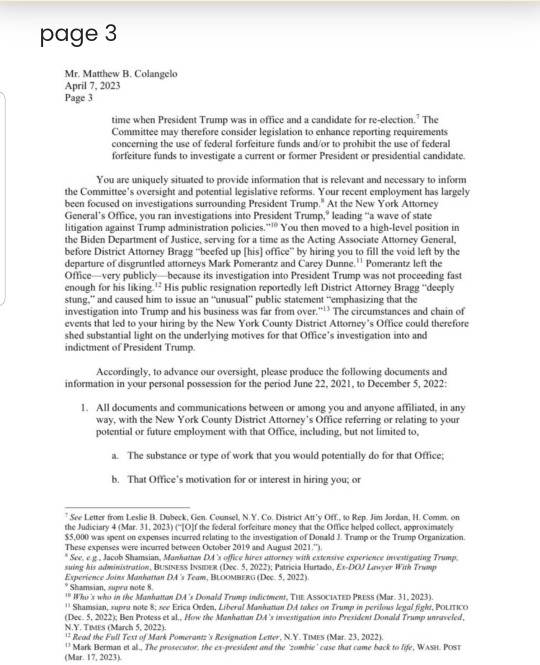

Exclusive: Jim Jordan Subpoenas Manhattan Prosecutor Who Resigned over Suspended Trump Probe April 6, 2023
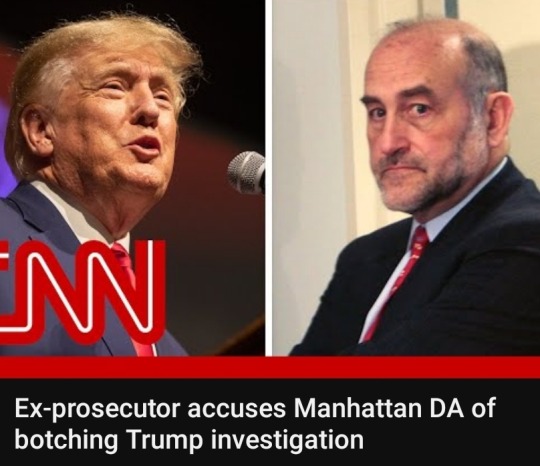
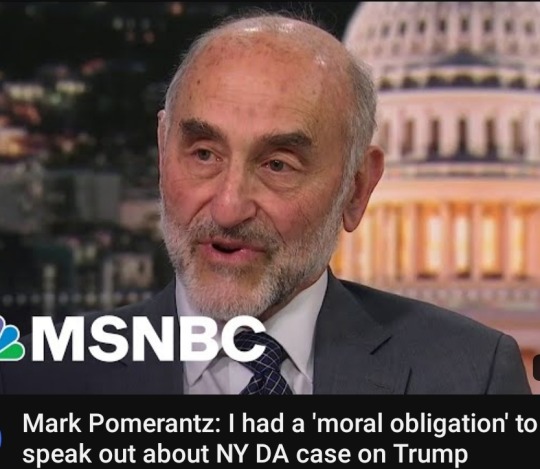
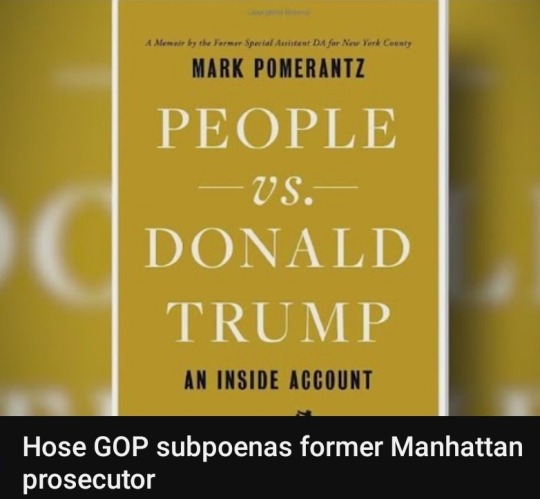
House Judiciary Committee chairman Rep. Jim Jordan (R-OH) escalated Republicans’ investigation into the Manhattan district attorney’s indictment of former President Donald Trump by subpoenaing a prosecutor on Thursday who resigned from the office last year over the district attorney’s initial reluctance to pursue Trump’s case.
Jordan’s subpoena, reviewed by Breitbart News, directs Mark Pomerantz, who resigned from Manhattan District Attorney Alvin Bragg’s office in February 2022, to appear before the committee for a deposition on April 20.
In a cover letter accompanying the subpoena, Jordan said his committee had legislative reasons to demand Pomerantz’s testimony.
“Congress has a specific and manifestly important interest in preventing politically motivated prosecutions of current and former Presidents by elected state and local prosecutors, particularly in jurisdictions—like New York County—where the prosecutor is popularly elected and trial-level judges lack life tenure,” Jordan wrote.
Pomerantz, a former special assistant assigned to the years-long Trump case, exited the Manhattan district attorney’s office right after Bragg took over. The move became a public affair when his resignation letter appeared in the New York Times last March.
Pomerantz wrote in the letter to Bragg that he believed Trump was “guilty of numerous felony violations” related to his financial statements and that he was
quitting because he thought Bragg’s decision at the time to “indefinitely” suspend the investigation into Trump was “misguided.”
Jordan observed, based on the resignation letter, that Pomerantz had “prejudged the results” of the investigation and that his critical words of Bragg seemingly sparked the district attorney to openly declare that the Trump investigation was “far from over.”
In November 2022, one week after Trump announced he was running for president again, the Times reported that Bragg had revived the Trump investigation and had zeroed in on a hush money scheme involving porn star Stormy Daniels and Trump’s former personal attorney Michael Cohen.
“For Mr. Bragg, the hush-money developments suggest the first signs of progress since he took office at the beginning of the year, when he balked at indicting Mr. Trump in connection with his business practices,” the outlet reported at the time.
Pomerantz later went on to publish a book about the matter, called People vs. Donald Trump: An Inside Account, in which Pomerantz discussed internal concerns people had about the investigation and worries about the credibility of Cohen, a convicted felon.
“You describe your eagerness to investigate President Trump, writing that you were ‘delighted’ to join an unpaid group of lawyers advising on the Trump investigations, and joking that salary negotiations had gone ‘great’ because you would have paid to join the investigation,” Jordan wrote of the book.
He added that Pomerantz “frivolously” compared Trump to John Gotti, a notorious New York City mob boss, and described him as a “malignant narcissist.”
“The depth of your personal animosity towards him is apparent in your writing,” Jordan concluded.
The subpoena marks Republicans’ strongest move yet in its investigation of the New York County’s indictment of Trump amid questions from some about Congress’s authority to probe open state-level criminal matters.
It comes after Jordanfirst contacted Pomerantz on March 22 seeking his testimony, as well as documents and communication related to the Trump investigation.
Jordan in his subpoena cover letter referenced correspondence on March 25 from Bragg to Pomerantz, which Breitbart News has reviewed, in which Bragg instructed Pomerantz, a private citizen, not to provide Congress with any materials relevant to Pomerantz’s work at the district attorney’s office.
Pomerantz then told the committee on March 27 that he would be complying with Bragg’s instructions rather than Jordan’s requests.🙄
Jordan contended Thursday, however, that Pomerantz is “uniquely situated” to provide insight to the Judiciary Committee and that
he has “no basis to decline to testify” given he has already made detailed accounts of his work on the Trump probe widely public.
EXCLUSIVE: House Judiciary Expands Investigation Into Manhattan DA Over Trump Indictment April 7, 2023
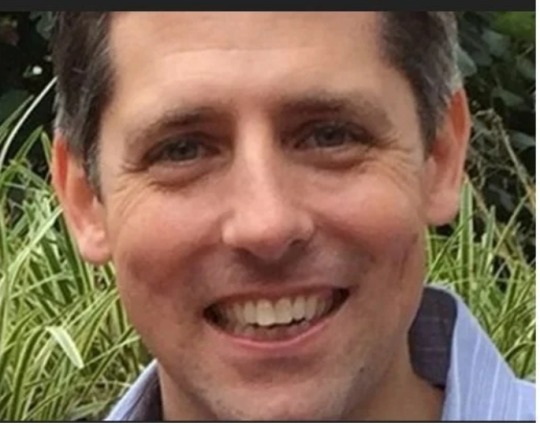
The Federalist: The House Judiciary Committee is expanding its investigation into the Manhattan District Attorney Alvin Bragg’s office over last week’s unprecedented indictment of former President Donald Trump.
On Friday, House Judiciary Chairman Jim Jordan, R-Ohio, sent a letter to Manhattan DA Senior Counsel Matthew Colangelo, shared with The Federalist, requesting a transcribed interview.
According to the New York Times in December, Colangelo was hired four months ago to “jump start” Bragg’s Trump investigations after years spent going after the former president at both the Department of Justice and the New York attorney general’s office.
“Given your history of working for law-enforcement entities that are pursuing President Trump and the public reporting surrounding your decision to work for the New York County District Attorney’s Office, we request your cooperation with our oversight in your personal capacity,” Jordan wrote.
Trump pled not guilty at the historic arraignment Tuesday against a 34-count felony indictment carrying a maximum 136-year prison sentence. The charges stem from 2016 hush-money payments to porn actress Stormy Daniels in a case prosecutors previously declined to pursue.
The weak nature of the case has led a dozen liberal law professors and Trump antagonists to call the prosecution a dead end.
The House Judiciary chairman reminded Colangelo of Congress’s authority to probe the Manhattan DA’s office after Bragg has spent weeks resisting lawmakers’ oversight requests. Fox News reported Wednesday the back and forth has led the Committee to consider issuing formal subpoenas for Bragg’s office. On Thursday, lawmakers pulled the trigger on a subpoena for Mark Pomerantz, a former prosecutor under Bragg who resigned last year over slow progress on efforts to arrest Trump.
Jordan revealed on Fox News Monday that Bragg conceded to lawmakers his office used federal funds in the Manhattan DA’s Trump investigation.
“The Committee may therefore consider legislation to enhance reporting requirements concerning the use of federal forfeiture funds and/or to prohibit the use of federal forfeiture funds to investigate a current or former President or presidential candidate,” Jordan wrote in the letter to Colangelo.
The committee is demanding Colangelo hand over documents related to his hiring and sit down for a formal interview. Colangelo was given until April 21 to provide lawmakers with a schedule of availability.
While the Manhattan DA’s office braces for aggressive oversight from House Republicans, members of Bragg’s staff deleted online profiles. The “Meet Our Team” page was also scrubbed from Bragg’s website.
Trump’s indictment last week drew immediate condemnation from House Republicans and the former president’s rivals in the 2024 primary but has been met with silence by Senate GOP Minority Leader Mitch McConnell.
#Matthew Colangelo#Mark Pomerantz#merry chrisis#alvin bragg is a dirty cop#nyc#sdny#lawfare#obama is scum#biden is obama's puppet#revenge#free trump#get trump
7 notes
·
View notes
Note
My name- Preet Kumar
DOB- Dec/28/1999
Time- 9:05 AM
Place- Patna, Bihar.
Question- About my career and marriage?
Hey!!!!!
Hope you are doing good 😊
Here's what i could gather up for the things you wanna know<3
Scorpio 10H (ruled by mars) sitting in 2nd house of Aquarius (Saturn) according to tropical it is ruled by Pluto which is sitting in 11H itself.
Leo 7H(ruled by sun in 12H) with Rahu sitting along.
DK planet being Jupiter sitting in 4H of Aries along with Saturn.
I've mentioned all the things that I will be considering so will just mention how it will effect.
One thing is for sure no matter job you do you will always have money 💰 (like literally your 10H rulers tropical or Vedic both are sitting in the H of finance {2&11})
You could get involved with construction, building, family business entrepreneurship etc.. You could be passionate/interested about these stuffs or simply money💲 (like come on ofc you are passionate about money MARS in the house of Finance😮💨 couldn't get any better and also Uranus in 1H) even than you could go for all these 😎🥵 but ofc you need to put Hard work otherwise 🙏🥲😵💫 Your hardwork in anything will give you sweet fruit 🍯🍓 plus these will also provide you power/authority. Nah!!!! Don't even try to deny you are not sick for these stuffs. 😏🤫 You are keen for rules and regulations out of sudden.Your strong focus , hard work and passion is the key to your success ❤️🔥
Uhmmmmm!!!!!! As for your fs here are some traits are
Taurus traits:- grounded, possesive, materialistic,PRETTY😮💨, passionate for family etc etc..
She will be a teacher to you :- younger or older, there's a lot of things that you could learn from her.
God complex sometimes 🤫(you yourself have one sometimes so don't judge.🐥)
She will also prefer rules to be followed within family.🐱
She will be family person.
Didn't wanna go to other stuffs but she will be good at it 🤭🤫(like will keep up with your kinks).
Philosophical, religious or spiritual.
Will expand your wealth or view on finance.
Will have Pisces or Sagittarius in big 3
Praise kink 😳🦋 compliment them that's all you need to do.
I provide you with alot 😂🤌 and now I know you'll be having 💰 so in return of thanks you wanna gift me something.... I don't know how to say NO 🥺👉👈 (jk)
One thing that i wanna suggest you is that to get up in your life (overall) be less selfish and focus and pay attention to your relationships.
I didn't mean to say that you are selfish but having ketu in first house makes you comfortable yet not comfortable within your self which is not so bad in reality but YOU NEED TO VALUE & PAY ATTENTION TO YOUR RELATIONSHIPS. relationship here doesn't just mean gf/bf but any relationship that you have (ur frds, family colleague etc.)
Now bbie 🌟

#art#astrology#celebrities#education#music#spirituality#writing#kpop#future spouse#ask blog#ask me questions#ask response#career astrology#career#vedic chart
20 notes
·
View notes
Text
Read this. Read the whole thing. The TL;DR is a horrifying example of corruption in the Trump administration.
Via Heather Cox Richardson
June 19, 2020 (Friday)
Tonight saw a Friday night news dump that will go into the history books.
Trump tried to fire the US Attorney from the Southern District of New York, Geoffrey S. Berman, who has managed a series of cases against Trump and his allies, including Trump fixer Michael Cohen, Trump lawyer Rudolph Giuliani, and Lev Parnas and Igor Fruman, who were indicted for funneling Russian money to Republican candidates for office. Berman is reported to be investigating Trump’s finances, among many other things.
It happened like this: Attorney General William Barr issued a statement announcing that Berman would be stepping down and that Trump would nominate Jay Clayton to replace him. Clayton has never been a prosecutor. He is currently the head of the Securities and Exchange Commission, but before he took that position he was a lawyer who, among other things, represented Deutsche Bank. Deutsche Bank is the only bank that would work with Trump after his bankruptcies. It might have given him loans he did not repay, and the Russian money-laundering that landed the bank in legal trouble might have helped Trump.
Legal analyst and Congressional staffer Daniel Goldman noted that this whole scenario was unusual. Normally, when a US Attorney leaves, that person’s deputy takes over. Bringing in a replacement from elsewhere meant that “Trump/Barr did not want anyone at SDNY running the office—likely because there was a serious disagreement.”
But then things got crazier. Berman issued his own statement, saying “I learned in a press release from the Attorney General tonight that I was ‘stepping down’ as United States Attorney. I have not resigned, and have no intention of resigning, my position to which I was appointed by the Judges of the United States District Court for the Southern District of New York. I will step down when a presidentially appointed nominee is confirmed by the Senate. Until then, our investigations will move forward without delay or interruption. I cherish every day that I work with the men and women of this Office to pursue justice without fear or favor—and intend to ensure that this Office’s important cases continue unimpeded.”
What’s Berman saying? Well, it might be that Trump’s preference for “acting,” rather than Senate-confirmed, officials has come back to bite him. Berman was not Senate-confirmed; he is an interim U.S. Attorney. By law, the Attorney General can appoint an interim U.S. Attorney for 120 days. At the end of that time, the court can appoint that person indefinitely.
Berman was one of those interim appointees, put in place by Trump’s first Attorney General, Jefferson Beauregard Sessions.
Berman’s appointment raised an outcry because he was handpicked by Trump. The U.S. Attorney for the SDNY oversees Manhattan and thus the president’s businesses and at least nine Trump properties. Trump went out of his way to take the unusual step of personally interviewing Berman, who donated $2,700 to the Trump campaign, served on the presidential transition team, and was a partner at the law firm where Trump’s lawyer Rudolph Giuliani is a member. Democrats vowed to block Berman’s nomination, but never got the chance because Sessions used the workaround so Berman would not come before the Senate.
Now, this means that because Berman was appointed by the United States District Court for the Southern District of New York, not the president, he apparently cannot be removed except by the court, or, possibly, by the president… but not by Barr. Lawyers are fighting over who, exactly, can remove Berman, but that itself says that any challenge he files will land in the courts for months… likely until after the election.
And that’s another notable thing about Berman’s statement. He suggests he is being fired because the administration wants to delay or interrupt an investigation, and his language suggests that both he and the administration know exactly what that investigation is. There are a number of reasons the SDNY might be examining the finances of the president or his family, but former National Security Advisor John Bolton suggested another reason in his forthcoming book: he apparently claims Trump assured Turkey’s autocratic leader Recep Tayyip Erdogan he would fill the SDNY with his own loyalists, which would enable him to do Erdogan a political favor.
As Berman’s predecessor in the job, Preet Bharara tweeted, “Why does a president get rid of his own hand-picked US Attorney in SDNY on a Friday night, less than 5 months before the election?” President of the Center for American Progress Neera Tanden noted: “To attempt a Friday night massacre 5 months before an election means there’s a pretty big investigation they are trying to kill.”
It seems worth noting that the Supreme Court is about to hand down a decision on whether Deutsche Bank and Trump’s accountants have to hand Trump’s financial records over to Congress and to the Manhattan district attorney, which might well spark legal trouble for the president in New York.
Law professor Stephen Vladeck also asked us to keep in mind that Barr “out-and-out * lied * in a written statement—and in a context in which there could have been little question to him that Berman would publicly call him out for doing so… And he did it anyway.” “Something * really * stinks,” Vladeck concluded.
Something else stinks about this crisis, too, and that is the Tulsa rally the president originally scheduled for tonight. Widespread objection to holding a Trump rally on Juneteenth—the historic celebration of Black freedom-- in Tulsa, where a race massacre destroyed the Black community of Greenwood in 1921, forced him to reschedule for tomorrow. But had the rally been held, with media focus on disturbances at it and on the spread of coronavirus there, it seems likely that Berman’s firing would not have gotten much attention.
Indeed, it has seemed all day as if Trump was deliberately stoking trouble in Tulsa. He began today by tweeting a threat: “Any protesters, anarchists, agitators, looters or lowlifes who are going to Oklahoma please understand, you will not be treated like you have been in New York, Seattle, or Minneapolis. It will be a much different scene!” (Americans have a constitutional right to protest.)
Then he made sure his supporters would be in the streets. In consultation with the Secret Service, the Tulsa police chief had asked Tulsa’s mayor to declare a curfew around the BOK Center where the rally will be held. He did so. But Trump pressured the mayor to rescind the curfew, which the mayor did. Trump tweeted "I just spoke to the highly respected Mayor of Tulsa, G.T. Bynum, who informed me there will be no curfew tonight or tomorrow for our many supporters attending the # MAGA Rally…. Enjoy yourselves - thank you to Mayor Bynum!”
This crisis feels big. Trump and Barr know an investigation is out there barreling toward the president, and they are willing to take extraordinary steps, steps that undermine our democracy and threaten our citizenry, to stop it.
26 notes
·
View notes
Text
कक्कड़ ने सिंगर रोहन प्रीत सिंह के संग सगाई की
सिंगर और इंडियन आइडल की जज नेहा कक्कड़ ने सिंगर रोहन प्रीत सिंह के संग सगाई की
https://abtakkhabar.in/entertainment/singer-and-indian-idol-judge-neha-kakkar-got-engaged-with-singer-rohan-preet-singh/ #nehaKakkar #rohanpreetsingh
1 note
·
View note
Text

Kalief Browder (May 25, 1993 – June 6, 2015) was an African American teen from The Bronx. In 2010, at age 16 years, Browder was accused of the theft of a backpack and its contents including a camera, $700, a credit card and an iPod Touch. Browder was imprisoned on Rikers Island for three years with time in solitary confinement. He was released when the prosecutor's case was found lacking in evidence and witnesses. The main witness had left the United States. Two years after his release from prison, Browder died by suicide by hanging himself from an air conditioning unit outside his bedroom window at his mother's home. Browder's supporters say his death was the result of mental and physical abuse sustained in prison. His case has been cited by activists who call for the reform of the New York City criminal justice system.
On May 15, 2010, Browder and a friend were apprehended by police on Arthur Avenue near East 186th Street in the Bronx. Browder said he was on his way home from a party. He thought the police were carrying out a routine stop-and-frisk. He had undergone this police procedure on a number of occasions.
Police officers were responding to a 9-1-1 call placed by Roberto Bautista about the theft of a backpack containing a camera, $700, a credit card and an iPod Touch. In his call Bautista said, "Two male black guys...they took my brother's book bag..." Browder said to the attending police officers, "I did not rob anyone, you can check my pockets." The police searched Browder, but they did not find the backpack. Bautista was sitting in the back seat of a police car. He identified Browder and his friend as the thieves. He then said the theft had not taken place that night but two weeks earlier. Bautista's testimony of the date of the theft varied between interviews.
Browder asked the officers, "What am I being charged for?" He said, "I didn't do anything!" A police officer said to Browder, "We're just going to take you to the precinct. Most likely you can go home.” Browder and his friend were taken to the 48th Police Precinct Station. They were fingerprinted and kept in a holding cell for a few hours. Then, they were taken to the Bronx County Criminal Court, where they were processed at the court's central booking.
Seventeen hours after the arrest, Browder was interrogated by a police officer and a prosecutor. The following day, Browder was charged with robbery, grand larceny, and assault. As he was on probation, Browder was not released. At Browder's arraignment, the charge given was second-degree robbery. Bail was set at $3,000. With a bail bondsman, the amount might have been $900 but Browder's family could not raise this amount, so he was imprisoned at Rikers Island. When his parents raised the money for bail, his bail was denied. No amount of money could get him out.
Browder was imprisoned at the Robert N. Davoren Center (R.N.D.C.) on Riker's Island. Preet Bharara, the United States Attorney for the Southern District of New York said that the R.N.D.C. had a "deep-seated culture of violence" where inmates suffered "broken jaws, broken orbital bones, broken noses, long bone fractures, and lacerations requiring stitches."
Altogether, Browder spent nearly two years in solitary confinement, mostly after fights with inmates. Browder later said that while in solitary confinement, he was beaten by corrections officers when in the shower. He said a verbal confrontation with a guard would escalate into a physical altercation. during his time in solitary confinement, Browder was allowed activities such as reading and also studied for the General Educational Development (G.E.D) exam.
Brendan O'Meara was appointed Browder's public defender. Browder always maintained that he was innocent. Although the assistant district attorney called Browder's a "relatively straightforward case", his trial was delayed by a backlog of work at the Bronx District Attorney's office.
Seventy-four days after his arrest, in July 2010, Kalief was brought before a judge at the Bronx County Hall of Justice. The grand jury indicted Browder on a charge second-degree robbery. A second charge of punching and pushing Bautista was heard. Browder made a plea of "not guilty". Browder's family went to a local bail bondsman about the new charge but the posting of bail was denied due to Browder's prior violation of his probation. On December 10, 2010, a potential trial date was made as prosecution and defense had submitted notices of readiness. Two hundred and fifty-eight days after his arrest, on January 28, 2011, Browder appeared in court. The prosecution requested a deferment of proceedings.
In 2014, Preet Bharara, the United States Attorney for the Southern District of New York took action against the City of New York for its use of "unnecessary and excessive force" on adolescents in Riker's Island. In January 2015, the New York City Council voted unanimously to end solitary confinement for inmates under the age of 21.
Soon after his release, Browder passed the G.E.D. exam. He then enrolled at the Bronx Community College (BCC). Kalief participated in the City University of New York's "Future Now" program, which offered a college education to previously incarcerated youths. Browder completed 11 credits and finished his semester with a grade point average of 3.562. Due to depression, Browder did not attend college in the fall semester but re-enrolled in the spring.
On May 11, 2015, Kalief Browder submitted a paper titled "A Closer Look at Solitary Confinement in the United States" for which he was scored an "A." He wrote, "Solitary confinement should be looked at as a whole around the United States and even though changes toward the solitary confinement system have begun in some states, more needs to be done and addressed around the country. In a lot of jails and prisons there are a lot of living circumstances and practices that go on within that are not addressed that people need to shed light on like solitary confinement, for example. Maybe another form of punishment or segregation should be implemented to deal with inmates who break jail rules as opposed to inmates who cause severe harm to other inmates and correction officers because the mental health risk it poses are too great."
Kalief worked as a tutor in mathematics for the G.E.D. exam at the BCC. He wanted to work to support his mother. Browder worked for a time as a security guard but was dismissed when his history of mental illness came to light. He also handed out flyers near Wall street. Browder said, "I see businessmen and businesswomen dressed in suits...I want to be successful, like them."
After his release, Browder's symptoms of depression persisted. He said, "People tell me because I have this case against the city I'm all right. But I'm not all right. I'm messed up. I know that I might see some money from this case, but that's not going to help me mentally. I'm mentally scarred right now. That's how I feel. Because there are certain things that changed about me and they might not go back." He also said, "Before I went to jail, I didn't know about a lot of stuff, and, now that I'm aware, I'm paranoid. I feel like I was robbed of my happiness."
On June 6, 2015 at 12:15 PM, Kalief committed suicide by hanging himself from an air conditioning unit outside his bedroom window at his mother's home. His mother discovered his body.
1 note
·
View note
Text
February 11, 2020 (Tuesday)
Heather Cox Richardson
As predicted, yesterday’s calm was short-lived. There were three major news items today but, put together, they added up to a surprisingly coherent narrative.
The first story was that one that has taken the media by storm: the Department of Justice, under Attorney General William Barr, today stepped into the sentencing of Trump advisor Roger Stone to reverse the recommendation the department had made yesterday.
In November, a jury convicted Stone of seven counts of obstructing and lying to Congress and tampering with witnesses concerning his role connecting the Trump campaign with Wikileaks in 2016. Career prosecutors in the Justice Department yesterday followed federal guidelines to recommend that the judge sentence him to between 7 and 9 years in prison. After they made this recommendation, Trump tweeted that the recommendations for the sentencing of his friend were “very unfair,” a “miscarriage of justice,” and a “ridiculous 9 year sentence recommendation.” Today, the department submitted a revision to its recommendation, telling the judge the previous recommendation was “excessive and unwarranted.”
It appears the Justice Department attorneys on this case learned about the revision by hearing it on the Fox News Channel. As soon as they heard, four of them—Aaron Zelinsky, Adam Jed, and Michael Marando-- filed paperwork to be removed from the case, and one, Jonathan Kravis, resigned his position as an assistant U.S. Attorney in Washington, D.C., going back to his home base as an assistant U.S. attorney in Baltimore.
It is hard to overstate the significance of this event.
The Department of Justice is supposed to defend the rule of law in America. It is not supposed to be swayed by political pressure, and traditionally, communicates with the White House only very generally, and never about specific cases. It is emphatically not the role of the Justice Department to work with the president, but rather its job is to guarantee equality before the law for everyone in America. The Attorney General is the lawyer for the American people, theoretically, while the White House Counsel is the lawyer for the office of the president. In addition, the president can have his or her own personal lawyers. But the idea that the Attorney General is working for the president undermines the whole idea of the impartial justice on which our body of laws rests.
I can’t resist noting here that, while the Constitution established an office of the Attorney General, President Ulysses S. Grant signed the bill creating the Department of Justice in 1870 to try to preserve the rights of African Americans in the South after the Civil War. The department’s first assignment was to stop the Ku Klux Klan in the South, and it did, indicting more than 3000 people and winning more than 600 convictions as it tried to reestablish the rule of law in the former Confederacy. That history reflects that the role of the Department of Justice is really about upholding the rule of law, not about doing any particular president’s bidding.
Even while this is going on, pundits noted that the judge, Amy Berman Jackson, whom Stone attacked online, apparently to try to get her to withdraw from the case, and then apologized when she didn’t, was unlikely to be moved by the revision. Tonight, though, Trump tweeted “Is this the Judge that put Paul Manafort in SOLITARY CONFINEMENT, something that not even mobster Al Capone had to endure? How did she treat Crooked Hillary Clinton? Just asking!” (Jackson did not put Manafort in solitary confinement.) Hillary Clinton retorted: “Do you realize intimidating judges is the behavior of failed-state fascists? Just asking!”
Meanwhile, Speaker of the House Nancy Pelosi tweeted that Trump had “engaged in political interference in the sentencing of Roger Stone. It is outrageous that DOJ has deeply damaged the rule of law by withdrawing its recommendation. Stepping down of prosecutors should be commended & actions of DOJ should be investigated.” Trump instantly responded “Who are the four prosecutors (Mueller people?) who cut and ran after being exposed for recommending a ridiculous 9 year prison sentence to a man that got caught up in an investigation that was illegal, the Mueller Scam and shouldn’t ever even have started? 13 Angry Democrats?”
(As an aside, can I just say I long, with every fiber of my being, for the days when profound political fights were not conducted by tweet?)
Pundits agree that this is a uniquely terrifying moment. But for all tonight’s outrage, it is not clear that Trump holds all the cards. As former US Attorney for the Southern District of New York Preet Bharara noted, the judge could insist on hearing from the withdrawing prosecutors before she lets them quit. We will know more tomorrow.
The second major story—although it is not being treated as such—is that the Trump administration has withdrawn the nomination of Elaine McCusker for the position of Pentagon Comptroller and Chief Financial Officer. Her confirmation hearing was scheduled for Thursday. Recently released emails show that McCusker pushed back on Trump’s order to withhold money from Ukraine and warned officials that they were likely breaking the law. While the White House is suggesting they are withdrawing the nomination because McCusker is not sufficiently loyal to Trump, the timing makes it likely that they do not want her in a confirmation hearing before the Senate, where she can be asked about the Ukraine Scandal.
And the third major story is the New Hampshire primaries. Before I talk about them, let me note that I am approaching them as a historian looking for patterns, rather than as a modern-day partisan, and I cannot tell you how much I don’t want to be swarmed with supporters of one candidate or another screaming at me that I’m wrong. Yes. I could be wrong. And no, I am neither thrilled by what I see, nor endorsing any candidate. But I will note what I see nonetheless in the hope it will be of interest to some of you. Dismiss it at will.
What has grabbed headlines tonight is that Vermont Senator Bernie Sanders, an Independent, has won the New Hampshire Democratic primary. But if you dig a little deeper, the New Hampshire primary showed something very interesting. Progressive candidates Bernie Sanders and Elizabeth Warren won 35% of the vote in New Hampshire, while the moderates—Pete Buttigieg, Amy Klobuchar, and Joe Biden-- won 53% of the vote. Now, for all the fact that we pay such deep attention to Iowa and New Hampshire, those states are emphatically not representative of either Democratic voters or of the United States at large. But it is not inappropriate to see groupings at this point, and to note that Democratic votes seem to be resting on candidates perceived to be moderate rather than those perceived to be more progressive. Super Tuesday, March 3 this year, when 14 states vote for presidential candidates, will tell us more about the preferred Democrat, not least because former New York City mayor Mike Bloomberg has saved his firepower for that contest.
But my guess is that the headlines trumpeting Sanders at this point are missing the larger story that today revealed so clearly. Americans are just sick of Trump, sick of his attempts to undermine the rule of law, and eager simply for a return to a stable government that does not produce constant drama. That the White House is so eager to keep McCusker from testifying before the Senate that they are withdrawing her nomination suggests that the drama is not yet over, and will not be over, for a long time.
[Original post with sources here]
[Heather Cox Richardson is a political historian who uses facts and history to make observations about contemporary American politics. She is the author, most recently, of To Make Men Free: A History of the Republican Party. She write these updates DAILY and they are amazing.]
#February 11 2020 (Tuesday)#Heather Cox Richardson#state of the union#us politics#usa#2020 primaries#2020 election#trump#William Barr#Roger Stone#recap
3 notes
·
View notes
Photo


We are so excited to have Nandini Bajpai on our blog today to talk about her latest book, A MATCH MADE IN MEHENDI:
Fifteen-year-old Simran “Simi” Sangha comes from a long line of Indian vichole-matchmakers-with a rich history for helping parents find good matches for their grown children. When Simi accidentally sets up her cousin and a soon-to-be lawyer, her family is thrilled that she has the “gift.”
But Simi is an artist, and she doesn’t want to have anything to do with relationships, helicopter parents, and family drama. That is, until she realizes this might be just the thing to improve her and her best friend Noah’s social status. Armed with her family’s ancient guide to finding love, Simi starts a matchmaking service-via an app, of course.
But when she helps connect a wallflower of a girl with the star of the boys’ soccer team, she turns the high school hierarchy topsy-turvy, soon making herself public enemy number one.
The synopsis for A MATCH MADE IN MEHENDI really grabbed my attention! Can you tell us more about the matchmaking Simi uses—and turns into an app—in the book?
Simi has watched her mother and aunt match people all her life and has definitely picked up on their methods. They judge compatibility by paying attention to shared values, priorities, and aesthetics instead of more superficial qualities. To quote from the Shagun Matchmaking Guide, the book passed down in Simi’s family, “Common sense can help judge the suitability of a match. Ask yourself: Do they agree on what’s right, what’s important, and . . .what’s funny?” Simi implements this by creating quizzes and memes for her peers to answer and rate in her dating app. The answers are run through an algorithm designed by her tech savvy brother and that’s how the app finds matches. It’s like automating the very hands-on approach of her foremothers with a lot of help from modern technology.
Simi sounds like a fun character. What did you enjoy most about writing her?
Simi was a fun character to write and it was interesting to try to understand her and be in her head. She did respect her family history but had to push back and test their methods in her own way. I liked her loyalty to her friends and family and how she tried to defend others instead of being a bystander. I also loved how she decided that she did not need permission from anyone to try and make an impact and leave her own mark in the world. It’s hard to make the choice to be your authentic self when it doesn’t fit other people’s idea of cool, and I enjoyed writing about her doing that.
Simi is an artist, and one of the art forms she uses is mehendi. What can you tell our readers about mehendi?
Mehendi, also known as henna, is a form of body decoration that is tightly linked to many ancient customs and traditions in South Asia and other regions where it is grown. The paste used for mehendi comes from the leaves of the mehendi plant…we had a mehendi hedge in a house I lived in growing up in India and I have great memories of mehendi at so many weddings and festivals. Simi is a talented artist and experiments with using mehendi in non-traditional ways for her art. She loves the organic feel of the mehendi dye and the link to her cultural heritage and is inspired to create with it. It also plays a role in finding her own match!
Besides Simi, who are the other major characters in the book? Please give us a brief introduction to them.
Well, there’s Simi’s best friend Noah. He and Simi have been friends since kindergarten and he nudges her to try the app at school to get people out of their perceived lanes and connect with each other. Both Simi and Noah would like to find and date the perfect boy. There’s Navdeep, Simi’s brother, the tech whiz behind the app. He doesn’t look like he’s paying attention, but he always has her back. And Aiden and Suraj…Simi’s crushes, not saying which one she’s with in the end. There are all the couples that Matched! app pairs up too. And there is Amanda, the girl who thinks she deserves all the things she wants, including the most popular boy in school.
Finally, there’s Simi’s extended family including her mom, aunt, and grandmother—the senior matchmakers in the family—and her twenty something cousins Geet and Preet who have absolutely no interest in the family matchmaking tradition.
If you could make an app that would go viral like Simi’s, what would the app be for?
I was asked that question before and my idea was to have an app that could take the list of books you love and tell you what book to read next, but my editor Nikki Garcia came up with a better idea–an app that could find your perfect match based on comparing both your book lists!
According to your website, A MATCH MADE IN MEHENDI is your first U.S. book, but you’ve published before in India. Have you noticed any interesting differences between the two industries?
There are so many differences! In India the young adult genre is very new and right now YA books kind of fall in the crack between children’s books and adult titles, though this is changing. The length of time it takes to go from a manuscript being acquired to being in print is much shorter there. There is no School and Library market for children’s books there yet and very few review journals. There are lots of regional languages apart the national language, Hindi, so the English language market is relatively small. Literary agents are rare too. I could go on…
What 2019 YA books by or about people of color or people from First/Native Nations are you looking forward to reading?
Right now the books at the top of my (very large!) 2019 TBR pile are The Downstairs Girl by Stacey Lee, Dear Haiti, Love Alaine by Maika Moulite, Patron Saints of Nothing by Randy Ribay, and Internment by Samira Ahmed. I’m also looking forward to The Light at the Bottom of the World by London Shah.
Is there anything else you’d like to tell us about A MATCH MADE IN MEHENDI?
I’d just like to say that A Match Made in Mehendi is a happy, feel-good read that celebrates desi culture and centers joy and I think it’s very important to have books about POC that do that!
Nandini Bajpai’s Bio:
I grew up in New Delhi, India, one of four sisters and many cousins in a family that liked to read. I lived and worked in India, Australia, and the US, before settling in the Boston area with my husband, kids, and a fluctuating number and variety of pets. Although I’ve been a bookseller, systems analyst, TEDx organizer, PTO Mom, animal foster and more, my first love is writing.
14 notes
·
View notes
Text
Majhail Vs Malvain Lyrics - Geeta Zaildar | Miss Pooja
#MajhailVsMalvain #GeetaZaildar #MissPooja

View On WordPress
0 notes